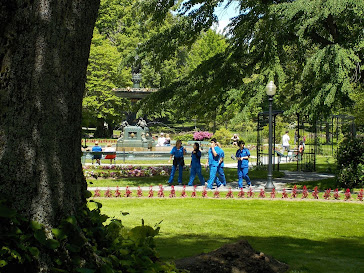The texts from the Roman Catholic Lectionary today invite us to contemplate the ongoing call for a change in our relationship with those we may underestimate or under value in our lives.
Included in our group
The reading from the Letter of Paul to Philemon is a plea for the former slave, Onesimus.
Paul uses very strong arguments (especially Phlm 19) in his touching appeal on behalf of Onesimus. It is unlikely that Paul is subtly hinting that he would like to retain Onesimus as his own slave, lent to Paul by his master. Rather, he suggests he would like to have Onesimus work with him for the gospel (Phlm 13, 20–21).1
Psalm 146 offers praise for God’s Help.
* [Psalm 146] A hymn of someone who has learned there is no other source of strength except the merciful God. Only God, not mortal human beings (Ps 146:3–4), can help vulnerable and oppressed people (Ps 146:5–9). The first of the five hymns that conclude the Psalter.2
In the Gospel of Luke, Jesus sets expectations for the coming of the Kingdom.
* [17:20–37] To the question of the Pharisees about the time of the coming of God’s kingdom, Jesus replies that the kingdom is among you (Lk 17:20–21). The emphasis has thus been shifted from an imminent observable coming of the kingdom to something that is already present in Jesus’ preaching and healing ministry.3
Mike Cherney thinks of a dozen stories of unexpected crossings of paths. His prayer today focuses on the mission that follows from transforming grace.
Heavenly Father,
This year has been and continues to be a time unlike others.
Allow me to see your presence in the people and settings that I experience.
Help me to recognize your graces in the midst of a changing order.Grant me the resilience to respond to your calls to service in this unsettled period.4
Don Schwager quotes “Don't pursue human glory,” by John Cassian (360-435 AD).
"If the devil has been driven out and sin no longer reigns, then the kingdom of God is established in us. As it is written in the Gospel, 'The kingdom of God does not come with observation, nor will they say, 'Lo here,' or 'Lo, there.' Truly I say to you that the kingdom of God is within you' (Luke 17:20-21). The only thing that can be 'within us' is knowledge or ignorance of the truth and the affection for righteousness or sin by which we prepare our hearts to be a kingdom of Christ or the devil. St. Paul described the nature of this kingdom in this way: 'For the kingdom of God is not food and drink, but righteousness and peace and joy in the Holy Spirit' (Romans 14:17). If the kingdom of God is within us and is righteousness, peace and joy, then someone that remains in these is surely within the kingdom of God. Someone that remains in unrighteousness, conflict and the melancholy that kills the life of the spirit is already a citizen of the devil's kingdom, of hell and of death. These are the signs whether it is God's kingdom or the devil's." (excerpt from CONFERENCE 1.13.5)5
The Word Among Us Meditation on Luke 17:20-25 comments that like these Pharisees, we all carry certain expectations that may prevent us from seeing the Lord among us.
In all the surprises life throws at us, God wants us to focus on one thing: he is in our midst—“the Kingdom of God is among you” (Luke 17:21). And because of that, we can trust that he will bring good out of every situation we face. Change and transition may be challenging. Loss can be upsetting. Sometimes even staying still can be difficult. But God will never abandon us. He will always be at our side, whether our situation is a surprise or not.6
Friar Jude Winkler comments that this authentic letter of Paul was written at a time when slavery was an established institution.The end of the liturgical year brings texts about the end of the world. Friar Jude suggests that grey hair is the best sign of the end time.
Fr. Richard Rohr, OFM, shares the work of Sikh activist, civil rights attorney, and author Valarie Kaur, who believes that “revolutionary love is the call of our times.”
“Revolutionary love” is the choice to enter into wonder and labor for others, for our opponents, and for ourselves in order to transform the world around us. It is not a formal code or prescription but an orientation to life that is personal and political and rooted in joy. Loving only ourselves is escapism; loving only our opponents is self-loathing; loving only others is ineffective. All three practices together make love revolutionary, and revolutionary love can only be practiced in community.7
Fr. Richard suggests that moments of felt darkness are both a tomb and a womb. We must die to the old before the truly new can be born. The imminent arrival of the end time for us may prompt our reflection on our action in relationship with marginalized people.
References

No comments:
Post a Comment